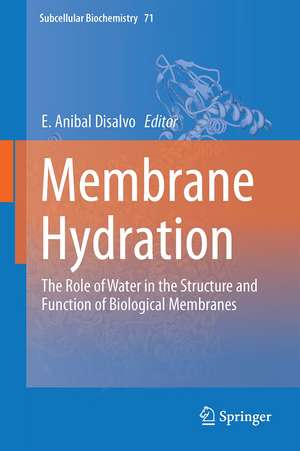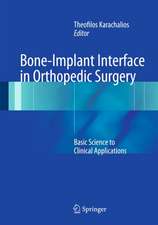Membrane Hydration: The Role of Water in the Structure and Function of Biological Membranes: Subcellular Biochemistry, cartea 71
Editat de E. Anibal Disalvoen Limba Engleză Hardback – 14 oct 2015
The chapters describe water organization at the lipid membrane–water interphase, the water penetration, the long range water structure in the presence of lipid membranes by means of X-ray and neutron scattering, general polarization, fluorescent probes, ATR-FTIR and near infrared spectroscopies, piezo electric methods, computer simulation and surface thermodynamics.
Permeation, percolation, osmotic stress, polarization, protrusion, sorption, hydrophobicity, density fluctuations are treated in detail in self-assembled bilayers. Studies in lipid monolayers show the correlation of surface pressure with water activity and its role in peptide and enzyme interactions. The book concludes with a discussion on anhydrobiosis and the effect of water replacement in microdomains and its consequence for cell function.
New definitions of lipid/water interphases consider water not only as a structural-making solvent but as a mediator in signalling metabolic activity, modulating protein insertion and enzymatic activity, triggering oscillatory reactions and functioning of membrane bound receptors. Since these effects occur at the molecular level, membrane hydration appears fundamental to understand the behavior of nano systems and confined environments mimicking biological systems.
These insights in structural, thermodynamical and mechanical water properties give a base for new paradigms in membrane structure and function for those interested in biophysics, physical chemistry, biology, bio and nano medicine, biochemistry,
biotechnology and nano sciences searching for biotechnological inputs in human health, food industry, plant growing and energy conversion.
| Toate formatele și edițiile | Preț | Express |
|---|---|---|
| Paperback (1) | 944.82 lei 6-8 săpt. | |
| Springer International Publishing – 23 aug 2016 | 944.82 lei 6-8 săpt. | |
| Hardback (1) | 803.50 lei 38-44 zile | |
| Springer International Publishing – 14 oct 2015 | 803.50 lei 38-44 zile |
Din seria Subcellular Biochemistry
- 18%
 Preț: 948.79 lei
Preț: 948.79 lei - 5%
 Preț: 1456.88 lei
Preț: 1456.88 lei - 18%
 Preț: 1373.84 lei
Preț: 1373.84 lei - 18%
 Preț: 1243.78 lei
Preț: 1243.78 lei - 18%
 Preț: 2098.81 lei
Preț: 2098.81 lei - 18%
 Preț: 1122.10 lei
Preț: 1122.10 lei - 5%
 Preț: 1160.63 lei
Preț: 1160.63 lei - 18%
 Preț: 1396.26 lei
Preț: 1396.26 lei - 18%
 Preț: 1114.96 lei
Preț: 1114.96 lei - 18%
 Preț: 1224.68 lei
Preț: 1224.68 lei - 18%
 Preț: 951.29 lei
Preț: 951.29 lei - 18%
 Preț: 1227.99 lei
Preț: 1227.99 lei -
 Preț: 398.15 lei
Preț: 398.15 lei -
 Preț: 399.88 lei
Preț: 399.88 lei - 18%
 Preț: 1231.47 lei
Preț: 1231.47 lei - 18%
 Preț: 1230.35 lei
Preț: 1230.35 lei -
 Preț: 392.60 lei
Preț: 392.60 lei - 18%
 Preț: 1231.47 lei
Preț: 1231.47 lei - 15%
 Preț: 638.76 lei
Preț: 638.76 lei - 5%
 Preț: 656.26 lei
Preț: 656.26 lei -
 Preț: 389.49 lei
Preț: 389.49 lei - 5%
 Preț: 659.19 lei
Preț: 659.19 lei -
 Preț: 392.37 lei
Preț: 392.37 lei - 5%
 Preț: 662.09 lei
Preț: 662.09 lei -
 Preț: 395.09 lei
Preț: 395.09 lei - 5%
 Preț: 667.99 lei
Preț: 667.99 lei -
 Preț: 400.47 lei
Preț: 400.47 lei - 18%
 Preț: 1224.54 lei
Preț: 1224.54 lei - 15%
 Preț: 647.73 lei
Preț: 647.73 lei - 15%
 Preț: 646.75 lei
Preț: 646.75 lei - 5%
 Preț: 662.30 lei
Preț: 662.30 lei -
 Preț: 395.25 lei
Preț: 395.25 lei - 18%
 Preț: 1230.21 lei
Preț: 1230.21 lei - 18%
 Preț: 1231.95 lei
Preț: 1231.95 lei - 18%
 Preț: 964.54 lei
Preț: 964.54 lei
Preț: 803.50 lei
Preț vechi: 1057.23 lei
-24% Nou
Puncte Express: 1205
Preț estimativ în valută:
153.75€ • 160.96$ • 127.22£
153.75€ • 160.96$ • 127.22£
Carte tipărită la comandă
Livrare economică 01-07 aprilie
Preluare comenzi: 021 569.72.76
Specificații
ISBN-13: 9783319190594
ISBN-10: 3319190598
Pagini: 284
Ilustrații: XVIII, 284 p.
Dimensiuni: 155 x 235 x 20 mm
Greutate: 0.74 kg
Ediția:1st ed. 2015
Editura: Springer International Publishing
Colecția Springer
Seria Subcellular Biochemistry
Locul publicării:Cham, Switzerland
ISBN-10: 3319190598
Pagini: 284
Ilustrații: XVIII, 284 p.
Dimensiuni: 155 x 235 x 20 mm
Greutate: 0.74 kg
Ediția:1st ed. 2015
Editura: Springer International Publishing
Colecția Springer
Seria Subcellular Biochemistry
Locul publicării:Cham, Switzerland
Public țintă
ResearchCuprins
Membrane Hydration: A hint to a new model for bio membranes.- Use of X-ray and neutron scattering methods with volume measurements to determine lipid bilayer structure and number of water molecules/lipid.- Water and Lipid Bilayers.- Hydration forces between lipid bilayers – a theoretical overview and a look on methods exploring dehydration.- Monitoring membrane hydration with 2-(dimethylamino)-6-acylnaphtalenes fluorescent probes.- Long-Range Lipid-Water Interaction as Observed by ATR-FTIR Spectroscopy.- Hydration And Nano confined Water. Some Insights From Computer Simulations.- Aquaphotomics: near infrared spectroscopy and water states in biological systems.- Hydration in lipid monolayers: Correlation of water activity and surface pressure.- Water at Biological Phase Boundaries: Its Role in Interfacial activation of enzymes and metabolic pathways.- Anhydrobiosis: An Unsolved Problem With Applications in Human Welfare.
Textul de pe ultima copertă
This book is about the importance of water in determining the structure, stability and responsive behavior of biological membranes. Water confers to lipid membranes unique features in terms of surface and mechanical properties. The analysis of the hydration forces, plasticiser effects, controlled hydration, formation of microdomains of confined water suggests that water is an active constituent in a water-lipid system.
The chapters describe water organization at the lipid membrane–water interphase, the water penetration, the long range water structure in the presence of lipid membranes by means of X-ray and neutron scattering, general polarization, fluorescent probes, ATR-FTIR and near infrared spectroscopies, piezo electric methods, computer simulation and surface thermodynamics.
Permeation, percolation, osmotic stress, polarization, protrusion, sorption, hydrophobicity, density fluctuations are treated in detail in self-assembled bilayers. Studies in lipid monolayers show the correlation of surface pressure with water activity and its role in peptide and enzyme interactions. The book concludes with a discussion on anhydrobiosis and the effect of water replacement in microdomains and its consequence for cell function.
New definitions of lipid/water interphases consider water not only as a structural-making solvent but as a mediator in signalling metabolic activity, modulating protein insertion and enzymatic activity, triggering oscillatory reactions and functioning of membrane bound receptors. Since these effects occur at the molecular level, membrane hydration appears fundamental to understand the behavior of nanosystems and confined environments mimicking biological systems.
These insights in structural, thermodynamical and mechanical water properties give a base for new paradigms in membrane structure and function for those interested in biophysics, physical chemistry, biology, bio and nanomedicine, biochemistry,
biotechnology and nanosciences searching for biotechnological inputs in human health, food industry, plant growing and energy conversion.
The chapters describe water organization at the lipid membrane–water interphase, the water penetration, the long range water structure in the presence of lipid membranes by means of X-ray and neutron scattering, general polarization, fluorescent probes, ATR-FTIR and near infrared spectroscopies, piezo electric methods, computer simulation and surface thermodynamics.
Permeation, percolation, osmotic stress, polarization, protrusion, sorption, hydrophobicity, density fluctuations are treated in detail in self-assembled bilayers. Studies in lipid monolayers show the correlation of surface pressure with water activity and its role in peptide and enzyme interactions. The book concludes with a discussion on anhydrobiosis and the effect of water replacement in microdomains and its consequence for cell function.
New definitions of lipid/water interphases consider water not only as a structural-making solvent but as a mediator in signalling metabolic activity, modulating protein insertion and enzymatic activity, triggering oscillatory reactions and functioning of membrane bound receptors. Since these effects occur at the molecular level, membrane hydration appears fundamental to understand the behavior of nanosystems and confined environments mimicking biological systems.
These insights in structural, thermodynamical and mechanical water properties give a base for new paradigms in membrane structure and function for those interested in biophysics, physical chemistry, biology, bio and nanomedicine, biochemistry,
biotechnology and nanosciences searching for biotechnological inputs in human health, food industry, plant growing and energy conversion.
Caracteristici
Provides details in modern techniques in surface properties of lipid membranes Correlates several aspects of membrane studies in relation to water properties that are scattered in the current literature Gives an outstanding coverage of specific bibliography Opens a new window to understand membrane phenomena in relation to biological functions











